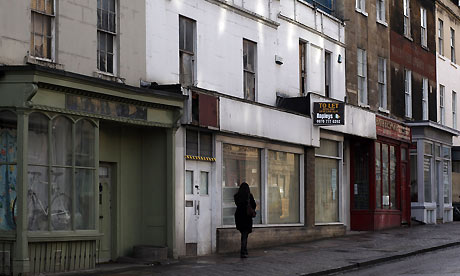You are here: Home » Business and Investments , Feature » North-South retail trade divide opens up as high streets decline
Empty shops in a town centre, once the vacancy rate gets to 20-30% new retailers are reluctant to to move in. Photograph Matt Cardy/Getty Images
A stark north-south divide is laid bare by a study published on Tuesday of shop vacancy rates which shows towns and cities in the Midlands and the north are being hardest hit by the high street downturn.
The highest number of shuttered shops was counted in Stockport where more than 30% are now empty, according to a report by the Local Data Company (LDC). The picture is also grim in Nottingham, Grimsby, Wolverhampton and Blackburn, where the vacancy rates increased and at least one in four stores are closed, according to the study of 700 British town centres.
The LDC director, Matthew Hopkinson, said that although the number of empty shops had "stabilised" at a national level in the last six months of 2011 the outlook was bleak: "The stable top line rate hides the significant breadth of town centre vacancy rates up and down the country. The odds are stacked against a positive take-up of shops and as such the new reality of 48,000 empty shops is here to stay unless an alternative use or purpose can be found."
The national vacancy rate edged down slightly from the 14.5% recorded in the first six months of 2011 to 14.3% in the second half. When broken down the headline figure is worse for Scotland and Wales, at 15.4% and 17.3% respectively, than England, where it is 14.2%. The shopping parades of the south and west fared best with Taunton, Salisbury and St Albans enjoying a vacancy rate of less than 9%. The most vibrant centre was Cambridge with a rate of 6.4%, although that masked a near 4% deterioration in the second half. There were also "extremes" of performance, with Swansea suffering a 15% jump in vacancies whereas Slough saw a 12% decline.
Last year the government asked TV presenter Mary Portas to come up with plan to save the high street and her subsequent report made 28 recommendations including "town teams" to lead community regeneration projects and the relaxation of planning laws to allow defunct stores to be turned into gyms, creches and bingo halls. The first step to implementing her ideas came last week when Grant Shapps, the local government minister, launched a competition for a dozen towns to become "Portas pilots" with the chance to share in a £1m pot to revitalise their "unloved and unused" high streets.
The traditional high-street store model is unravelling as the growth of the internet and huge out-of-town supermarkets selling everything from groceries to sofas, clothing, and CDs, suck sales out of town centres.
Official data shows that the proportion of retail spending captured by the high street has fallen from nearly 50% in 2000 to 42.5% and is expected to drop below 40% by 2014. At the same time online sales have doubled over the last decade to make up 10% of retail sales. "Is it any wonder that vacancy rates are rising?" said Hopkinson. "Technology is driving consumer behaviour to a world of engagement, entertainment and the ability to shop where, how and when we like."
Some senior industry figures believe the government is wasting its time trying to resuscitate high streets and should consider radicalalternatives such as redeveloping shops as houses. Last week Phil Wrigley, a veteran retailer who has held directorships at New Look, Debenhams and BHS, said many shopping streets were "in a death spiral" and "irrelevant to the needs of shopping today", and likened their fate to the shipbuilding industry.
The pace of high street closures is expected to accelerate as it is estimated that about 50% of the country's shop leases expire over the next seven years, giving struggling chains the opportunity to retrench from the weakest trading locations.
The British Council of Shopping Centres estimates that a fifth of UK shopping malls are in difficulties with about 20 smaller centres up for sale.
source:http://www.guardian.co.uk/business/2012/feb/07/retail-trade-north-south-divide
Category: Business and Investments , Feature
Related posts:
If you enjoyed this article, subscribe to receive more great content just like it.
Subscribe to:
Post Comments (Atom)












0 comments:
Post a Comment